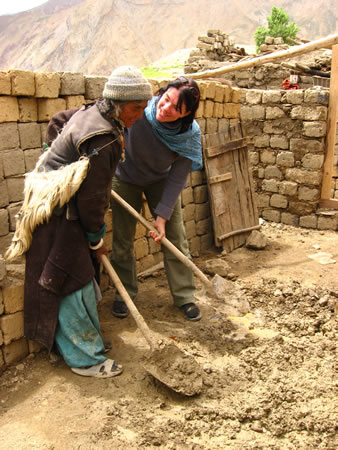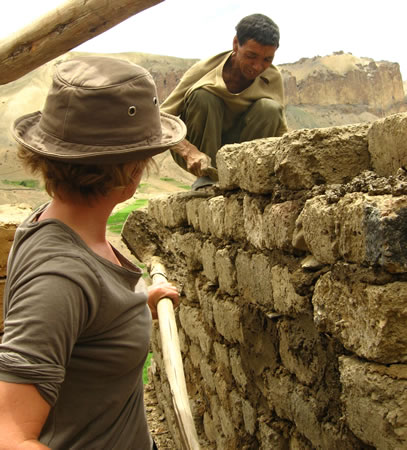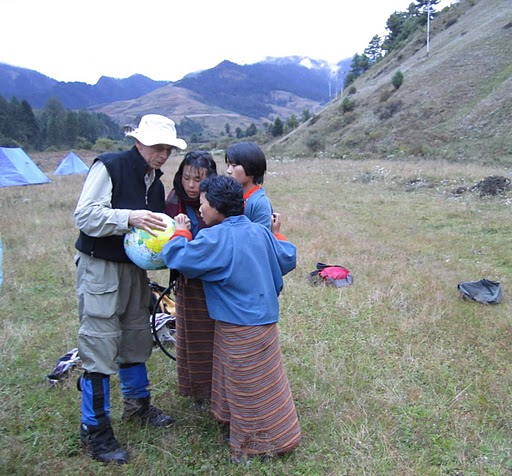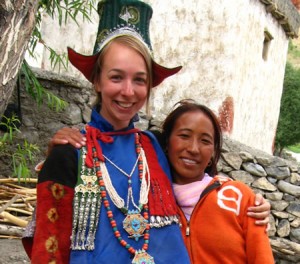 In this month’s National Geographic Traveler, Costas Christ questions the ever-blossoming voluntourism industry in his article, The Giver’s Conundrum. As both a traveler and a staff member at a non-profit volunteer travel organization, this is something I think and talk about almost every day. The questions that come up are completely valid and, in my eyes, very important to look at. What are we really doing to help?
In this month’s National Geographic Traveler, Costas Christ questions the ever-blossoming voluntourism industry in his article, The Giver’s Conundrum. As both a traveler and a staff member at a non-profit volunteer travel organization, this is something I think and talk about almost every day. The questions that come up are completely valid and, in my eyes, very important to look at. What are we really doing to help?
In his own voluntourism experience in Kenya, Costas observed that the local residents accomplished far more on their school building project in one hour than the whole volunteer team did in a half day. Having experienced volunteer trips in Peru, India and Thailand myself, I concur – we’re not the fastest work force. I remember trying shovel mud to help make bricks for my host family’s home in Ladakh, India. Shoveling at 14,000+ feet in the Himalayas had me breathless and fatigued in 5 minutes, while my host father Tsering scurried along the newly-forming wall, his small frame heaving heavy mud bricks with ease, as though he’d been doing it all of his life.
Because he had.
Tsering’s body was fully conditioned for this type of work. He’d lived at altitude all his life, and these rudimentary building materials have passed through his hands many times. He knew what he was doing, and would have completed the new room on his house before winter whether I and my fellow travelers had come to help him out or not. But that’s not the point.
The point is that my group of travelers had come all the  way to rural Northern India, trekking for 5 days to reach Tsering’s remote mountain home. It’s our presence as tourists from the “developed world”, coming to a place like Ladakh and saying, “We want to do this – we want to have meaningful interactions with locals, we want to recognize and support their own efforts to succeed, and we want to help empower them to flourish”, that actually has the most impact and validation. The Ladakhi culture is an ancient, yet endangered thing. We didn’t come in bringing modern equipment to show them “how to do it” – we used their tried-and-true methods and traditional materials. We pitched in as a way of supporting and honoring their way of life.
way to rural Northern India, trekking for 5 days to reach Tsering’s remote mountain home. It’s our presence as tourists from the “developed world”, coming to a place like Ladakh and saying, “We want to do this – we want to have meaningful interactions with locals, we want to recognize and support their own efforts to succeed, and we want to help empower them to flourish”, that actually has the most impact and validation. The Ladakhi culture is an ancient, yet endangered thing. We didn’t come in bringing modern equipment to show them “how to do it” – we used their tried-and-true methods and traditional materials. We pitched in as a way of supporting and honoring their way of life.
On a good voluntourism program, your funds stay local, going towards local businesses and helping to support local families. Keeping money local is a way of “voting with your tourist dollars” – it validates local culture, encourages local pride, and helps support independence from large, foreign corporations making money off the backs and lands of local people. To me, this is the greatest benefit that the voluntourist brings with them.
Several partner communities I work with don’t select hard labor projects for visiting volunteers. Do you know what they really want? English lessons for their children, so that they’ll have more opportunities open to them as adults, not only by having a grasp  on the language of world commerce, but also an understanding of other culture and people outside of the insular home they’ve grown up in.
on the language of world commerce, but also an understanding of other culture and people outside of the insular home they’ve grown up in.
But the traveler benefits hugely from the experience as well. The impact of the home stays and work projects I have experienced on these trips has been life-changing. I see it happen every time a group returns. Trip highlights are rarely the day spent exploring the ruins of Machu Picchu, or seeing big game on safari in Kenya. It’s the connection to the local people, the care and kindness, the true sense of exchange and connection that comes without words when you’ve shared a meal, slept on the floor and sweat together.
In his article, Costas Christ makes a pithy summation, “My advice: Start by probing your own motivations, and be honest with yourself about what you find out.” In our technologically-advanced yet disconnected world, so many of us just yearn to connect with others, especially in travel. It’s a hugely powerful experience, and I don’t  think we should pretend that this is not what motivates the vast majority of us to seek out experiences like these. In fact, I think it’s crucial that we use these experiences to tap into the great wealth of love and compassion we all carry in our hearts, and to allow it to awaken a sense of inspiration and empowerment for the true purpose in our lives.
think we should pretend that this is not what motivates the vast majority of us to seek out experiences like these. In fact, I think it’s crucial that we use these experiences to tap into the great wealth of love and compassion we all carry in our hearts, and to allow it to awaken a sense of inspiration and empowerment for the true purpose in our lives.
With so many voluntourism opportunities springing up, however, it’s more important than ever to make informed decisions about what you sign on for. Costas points out that many for-profit businesses are cashing in on the “trend”, and travelers are paying blindly to take part in unsustainable projects with little to no lasting local benefit while the organizers profit. Crooked Trails, the community-based tourism organization I work for, is a bit of a special case because it is a federally-recognized non-profit; it’s very structure is created to help channel the funds of tourism in local communities into projects that support them. Being informed about how your money plays into a volunteer program, as well as understanding the non-tangible impacts, is a crucial part of being an informed traveler. (Click here to read my tips for finding a great volunteer trip.) But also ask yourself what you truly seek out of the experience; what you can bring, and what you might take away. And honor that.
All photos by the author except:
Travel and kids in Bhutan: Deters/Luksus via Crooked Trails